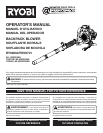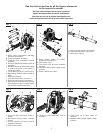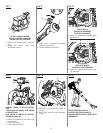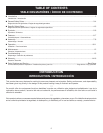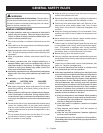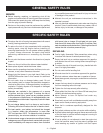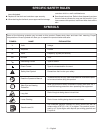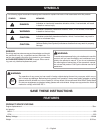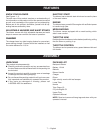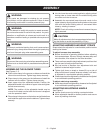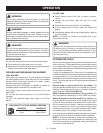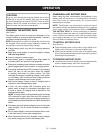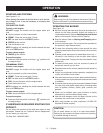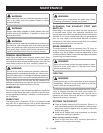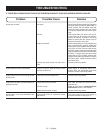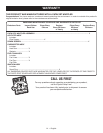
4 — English
To reduce the risk of hearing loss associated with sound
level(s), hearing protection is required.
To reduce the risk of injury associated with contacting
rotating parts, stop the engine before installing or
removing attachments. Do not operate without guard(s)
in place. Always disconnect the spark plug before
performing maintenance or accessing any movable
parts.
Do not point the blower nozzle in the direction of people
or pets.
Never run the unit without the blower tubes installed.
Never place objects inside the blower tubes.
Never use for spreading chemicals, fertilizers, toxic sub-
stances, or any other hazardous chemical.
Always hold the blower in your right hand. Refer to the
OPERATION section later in this manual for additional
information.
Do not crush, drop or damage battery pack. Do not
use a battery pack or charger that has been dropped or
received a sharp blow. A damaged battery is subject to
explosion. Properly dispose of a dropped or damaged
battery immediately.
Batteries can explode in the presence of a source
of ignition, such as a pilot light. To reduce the risk of
serious personal injury, never use any cordless product
in the presence of open flame. An exploded battery can
propel debris and chemicals. If exposed, flush with water
immediately.
Do not charge battery tool in a damp or wet location.
Following this rule will reduce the risk of electric shock.
For best results, your battery tool should be charged
in a location where the temperature is more than
50°F but less than 100°F. To reduce the risk of serious
personal injury, do not store outside or in vehicles.
Under extreme usage or temperature conditions, battery
leakage may occur. If liquid comes in contact with your skin,
wash immediately with soap and water, then neutralize
SPECIFIC SAFETY RULES
with lemon juice or vinegar. If liquid gets into your eyes,
flush them with clean water for at least 10 minutes, then
seek immediate medical attention. Following this rule will
reduce the risk of serious personal injury.
REFUELING
Fuel is highly flammable. Take precautions when using
to reduce the chance of serious personal injury.
Empty fuel tank into a container approved for gasoline
and restrain the unit from moving before transporting in
a vehicle.
To reduce the risk of fire and burn injury, handle fuel with
care. It is highly flammable.
Do not smoke while handling fuel.
Mix and store fuel in a container approved for gasoline.
Mix fuel outdoors where there are no sparks or flames.
Select bare ground, stop engine, and allow to cool before
refueling.
Loosen fuel cap slowly to release pressure and to keep
fuel from escaping around the cap.
Tighten the fuel cap securely after refueling.
Wipe spilled fuel from the unit. Move 30 feet away from
refueling site before starting engine.
Never attempt to burn off spilled fuel under any
circumstances.
Store fuel in a cool, well-ventilated area, safely away from
spark and/or flame-producing equipment.
Store fuel in containers specifically designed for this
purpose.
Only refuel outdoors and do not smoke while refueling.
Add fuel before starting the engine. Never remove the cap
of the fuel tank or add fuel while the engine is running or
when the engine is hot.
If fuel is spilled, do not attempt to start the engine but
move the machine away from the area of spillage and
avoid creating any source of ignition until fuel vapors
SERVICE
Before cleaning, repairing, or inspecting, shut off the
engine and make certain all moving parts have stopped.
Disconnect the spark plug wire, and keep the wire away
from the plug to prevent starting.
Service on the product must be performed by qualified
repair personnel only. Service or maintenance performed
GENERAL SAFETY RULES
by unqualified personnel could result in injury to the user
or damage to the product.
Maintain the unit per maintenance instructions in this
operator’s manual.
Use only identical replacement parts when servicing the
product. Use of unauthorized parts may create a risk of
serious injury to the user, or damage to the product.



